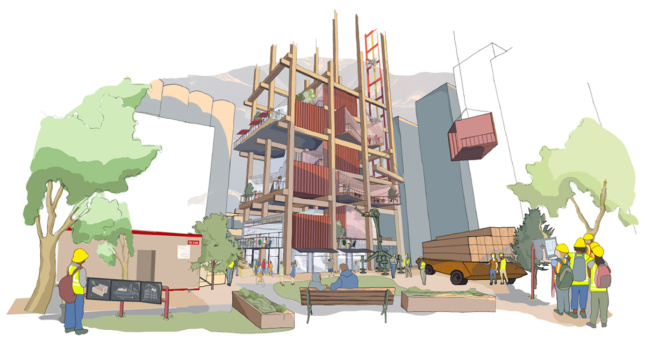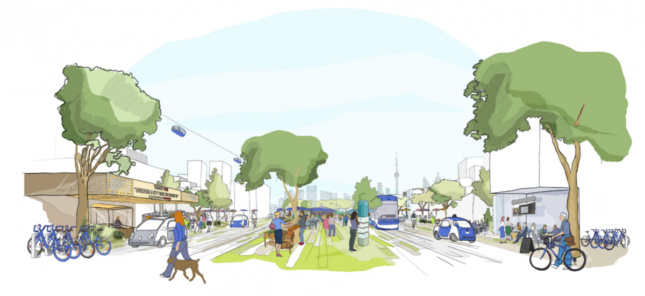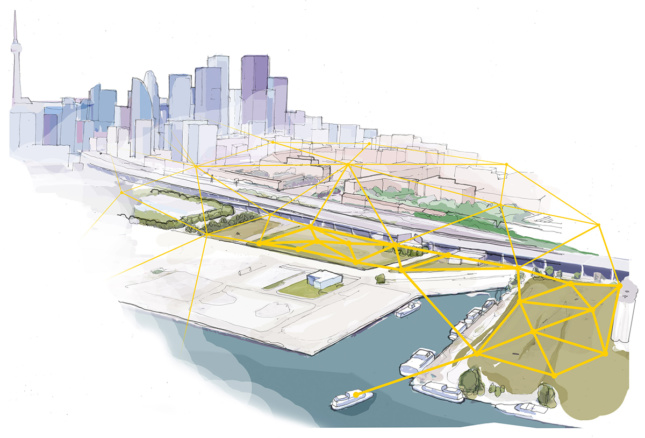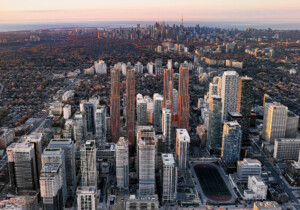On Tuesday, Sidewalk Labs and Waterfront Toronto signed a deal that pared down some of the business’s plans to design a smart city on the Canadian city’s lakeshore.
Sidewalk Labs, a New York-based urban innovation startup founded by Google’s parent company, Alphabet, was selected last year to work with Waterfront Toronto, a government-backed corporation, to reimagine underdeveloped parcels on the city’s eastern edge. The proposal, Sidewalk Toronto, envisioned 800 acres of waterfront as a test hub for new urban technologies.
Since the announcement, details about the project have been slow to emerge, but last week a 58-page agreement between Sidewalk and Waterfront Toronto revealed a narrower scope for the tech company than originally imagine. Rather than having influence over the entirety of the city’s waterfront, Sidewalk Labs has been given a more stringent site plan and governance with just 12 acres of land available for its new high-tech neighborhood at Quayside.

The site sits south of Toronto’s downtown at Parliament Slip, a long-underutilized port and empty space adjacent to the city’s elevated highway. While many of the design details have been kept under wraps since Sidewalk Labs was chosen for the project last fall, we do know that it aims to combine a new mobility system for transportation, sustainable and flexible buildings, data integration, and digital infrastructure. In the initial description and renderings, Quayside features “futuristic city” tech innovations such as sensors that can detect pedestrians at traffic lights, robot vehicles that can transport garbage via underground tunnels, and a transformative street layout fit for shared self-driving cars.

According to the new documents, the city of Toronto doesn’t plan to give over any other waterfront lands except the Quayside parcel to the Sidewalk Labs project, although Waterfront Toronto officials say that expanding later on to neighboring sites is still a possibility. It was also made clear that Sidewalk Labs will have zero equity in the project, though the group initially invested US$50 million on public consultations and pre-design and -development work. That money could be recovered in their share of the profits should the final plans be approved. To move forward, the designs must go through a series of public roundtables this fall and eventually be looked over by the city council.
While a new waterfront scheme has been in talks for years, Toronto is now pushing back on Sidewalk Labs’ design largely, it seems, because the grand vision for the project isn’t all that clear. Many critics have noted the original framework for the proposal was thin on details, especially regarding how Sidewalk Labs would collect and use Torontonians’ data and ensure privacy. In the new agreement, a set of protections and promises are listed but there are no specifics on how the partners would enact those are laid out yet.

According to The Globe and Mail, one of Waterfront Toronto’s board members, developer Julie Di Lorenzo who was outspoken in her opposition to Sidewalk Labs’ plan, stepped down from her seat recently because she was “uncomfortable with the nature of the agreement.” In early July, the corporation’s CEO Will Fleissig also suddenly resigned from his position. Tuesday’s deal was signed unanimously with neither formerly involved parties present.
The explosion of excitement surrounding smart cities has lessened in recent months, in part due to concerns over how data would safely be distributed across a city-wide digital infrastructure. Not only that, but the question remains unanswered as to whether or not technology is ready for built-from-scratch cities to pop up overnight. Early promises like the self-driving car have yet to find their footing.
Waterfront Toronto plans to break ground on the project as early as next spring if all approvals go through. Since this is Sidewalk Lab’s first chance to reinvent the smart city, if it doesn’t work out there, they’ll have to find another town to take them on.











